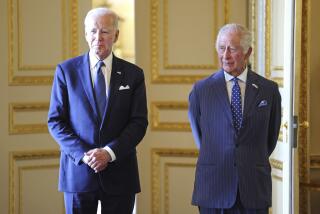Reagan the Visionary Leaves Britons Cold
- Share via
LONDON — One of the most striking features of the British reaction to the Reykjavik summit is how little criticism there has been of President Reagan. He is not the most popular of American politicians on this side of the Atlantic. His Strategic Defense Initiative provokes private skepticism among British ministers and open misgivings among the public.
So Reagan might have been widely condemned for missing a unique opportunity for the sake of a defensive system that will not work anyway. Instead, much comment has appreciated the impossibility of reaching sweeping settlements in such hectic negotiations over a brief weekend. There has even been some approving astonishment that so much progress was made in so short a time.
What is disturbing from a British standpoint, however, is that immediately on his return the President declared: i”We are closer than ever before to agreements that could lead to a safer world without nuclear weapons.”
Perhaps this kind of remark might not matter so much if we could be sure that he did not really mean it. Some allowance must be given to a President engaged in a propaganda battle after what looks like a diplomatic failure.
But in fact such extravagant optimism is disconcerting to British opinion--whether Reagan means it or not. If this is what he really believes, it raises the specter of a disarmament agreement that would be contrary to British and Western European interests in general.
Whatever British ministers may say in public, there is a good deal of relief in London that no deal was done on the terms that were being negotiated in Reykjavik.
The complete elimination of all intermediate-range nuclear missiles from Europe, East and West, is not, in fact, attractive to the British government or to much informed opinion in Britain. That this is not widely appreciated can be attributed largely to the way in which the British and other West European governments chose to present the issue during the propaganda battle to get the missiles installed.
The real reason why the British government wanted to have them in the first place was to close a gap in the chain of deterrence. There was the fear that the United States might someday be faced with the stark choice of either having to accept the fact of a Soviet victory in Europe with conventional arms, or employ intercontinental missiles that would immediately put American cities in jeopardy.
A system for the defense of Europe that put the U.S. mainland so directly at risk might come to lack credibility, both in allied and in Soviet eyes.
The creation of an intermediate nuclear capability in Europe was seen as a means of making the deterrent more convincing and of coupling the United States more securely to the defense of Western Europe.
But this line of reasoning was too esoteric to counter the emotive arguments of the peace movements. So European governments came to rely on the simpler proposition that the missiles were needed to balance the Soviet SS-20s.
If all the SS-20s were removed, this still would not achieve the original purpose of the Euromissiles. If SS-20s were removed only from Europe and stockpiled in Asia--as proposed at Reykjavik--they could easily be switched whenever the Soviet leaders wished. Whereas if the American missiles are taken home, they are unlikely ever to return to Western Europe.
It would be even worse if all the intermediate Euromissiles went but the Soviet Union was allowed to keep its present stock of smaller missiles.
Worst of all would be to move toward complete nuclear disarmament, if that were ever possible, without at the same time securing a deal on chemical and conventional weapons. That would simply be making Europe safe once again for conventional warfare, where the Soviet Union has preponderant strength.
Even if President Reagan is only indulging in deliberate exaggeration for political purposes, at home or abroad, that would still be damaging in British eyes because it would undermine his credibility.
Nothing has done more to provoke British misgivings about SDI than the excessive claims that Reagan has made for it. When he speaks of rendering nuclear weapons “impotent and obsolete,” the British find his remarks incredible.
He has a habit of clothing practical proposals in visionary rhetoric. This utopian approach is contrary to the British tradition in both foreign and defense policy. So when the President focuses on what the British regard as unachievable aspirations in the field of disarmament, they tend to wonder if he can really be serious about the more limited measures that they eagerly desire and do believe to be possible.
Britain wants to maintain a balance of strength at a lower level of arms and believes that the only way to achieve this is by careful negotiation--step by step.
More to Read
Sign up for Essential California
The most important California stories and recommendations in your inbox every morning.
You may occasionally receive promotional content from the Los Angeles Times.










